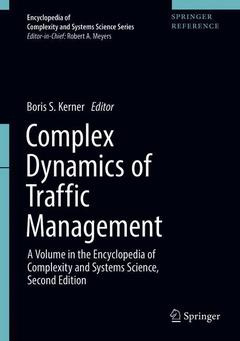Complex Dynamics of Traffic Management, 1st ed. 2019 Encyclopedia of Complexity and Systems Science Series

Boris Kerner was born in Moscow in 1947 and graduated from the Moscow Technical University MIREA in 1972. Boris Kerner received his Ph.D. and Sc. D. (Doctor of Sciences) from the Academy of Sciences of the Soviet Union, respectively, in 1979 and 1986. Between 1972 and 1992, his major interests include the physics of semiconductors, plasma, and solid-state physics as well as the development of a theory of autosolitons – solitary intrinsic states, which form in a broad class of physical, chemical, and biological dissipative systems. Since 1992 Boris Kerner worked for the Daimler Company in Stuttgart, Germany. His major interest since then was the understanding of vehicular traffic. The empirical nucleation nature of traffic breakdown at highway understood by Boris Kerner is the basis for three phase traffic theory, which he introduced and developed in 1996–2002. Between 2000 and 2013, Boris Kerner was Head of a scientific research field Traffic at the Daimler Company in Stuttgart (Germany). In 2011, Boris Kerner was awarded with the degree Professor at the University of Duisburg-Essen in Germany. After his retirement from the Daimler Company on January 31, 2013, Prof. Kerner works at the University of Duisburg-Essen. Boris Kerner is the author of more than 250 scientific works and patents as well as four books that are devoted to a variety of physical systems, complex dynamics of traffic flow in traffic and transportation networks, applications of diverse intelligent transportation systems for traffic prognosis, traffic control, dynamic traffic assignment, as well as a study of autonomous and connected vehicles in mixed traffic flow.
Includes state-of-the-art topics from self-driving cars to ground- and air-based mass transit
Considers practical issues such as network delays, traffic breakdown, and evacuation dynamics
Covers both pedestrian and vehicular traffic
Date de parution : 04-2019
Ouvrage de 763 p.
17.8x25.4 cm
Disponible chez l'éditeur (délai d'approvisionnement : 15 jours).
Prix indicatif 369,24 €
Ajouter au panier